- Home
- John le Carré
Tinker, Tailor, Soldier, Spy Page 3
Tinker, Tailor, Soldier, Spy Read online
Page 3
“Do you think that sweater’s kosher,” he asked in a high, jokey voice, “or do you think he pinched it?”
“Leonard, that’s very unfair,” Thursgood scolded, hammering at the flanks of his Labrador. “Bite him, Ginny, bite the bad man.”
By the time he reached his study, however, Thursgood’s laughter had quite worn off and he became extremely nervous. Bogus Oxford men he could deal with, just as in his time he had known classics masters who had no Greek and parsons who had no divinity. Such men, confronted with proof of their deception, broke down and wept and left, or stayed on half-pay. But men who withheld genuine accomplishment—these were a breed he had not met but he knew already that he did not like them. Having consulted the university calendar, he telephoned the agency—a Mr. Stroll, of the house of Stroll & Medley.
“What precisely do you want to know?” Mr. Stroll asked with a dreadful sigh.
“Well, nothing precisely.” Thursgood’s mother was sewing at a sampler and seemed not to hear. “Merely that if one asks for a written curriculum vitae one likes it to be complete. One doesn’t like gaps. Not if one pays one’s fee.”
At this point Thursgood found himself wondering rather wildly whether he had woken Mr. Stroll from a deep sleep to which he had now returned.
“Very patriotic bloke,” Mr. Stroll observed finally.
“I did not employ him for his patriotism.”
“He’s been in dock,” Mr. Stroll whispered on, as if through frightful draughts of cigarette smoke. “Laid up. Spinal.”
“Quite so. But I assume he has not been in hospital for the whole of the last twenty-five years. Touché,” he murmured to his mother, his hand over the mouthpiece, and once more it crossed his mind that Mr. Stroll had dropped off to sleep.
“You’ve only got him till the end of term,” Mr. Stroll breathed. “If you don’t fancy him, chuck him out. You asked for temporary, temporary’s what you’ve got. You said cheap, you’ve got cheap.”
“That’s as may be,” Thursgood retorted gamely. “But I’ve paid you a twenty-guinea fee; my father dealt with you for many years and I’m entitled to certain assurances. You’ve put here—may I read it to you?—you’ve put here: ‘Before his injury, various overseas appointments of a commercial and prospecting nature.’ Now that is hardly an enlightening description of a lifetime’s employment, is it?”
At her sewing his mother nodded her agreement. “It is not,” she echoed aloud.
“That’s my first point. Let me go on a little.”
“Not too much, darling,” warned his mother.
“I happen to know he was up at Oxford in 1938. Why didn’t he finish? What went wrong?”
“I seem to recall there was an interlude round about then,” said Mr. Stroll after another age. “But I expect you’re too young to remember it.”
“He can’t have been in prison all the time,” said his mother after a very long silence, still without looking up from her sewing.
“He’s been somewhere,” said Thursgood morosely, staring across the windswept gardens towards the Dip.
All through the summer holidays, as he moved uncomfortably between one household and another, embracing and rejecting, Bill Roach fretted about Jim: whether his back was hurting; what he was doing for money now that he had no one to teach and only half a term’s pay to live on; worst of all, whether he would be there when the new term began, for Bill had a feeling he could not describe that Jim lived so precariously on the world’s surface that he might at any time fall off it into a void; he feared that Jim was like himself, without a natural gravity to hold him on. He rehearsed the circumstances of their first meeting, and in particular Jim’s enquiry regarding friendship, and he had a holy terror that just as he had failed his parents in love, so he had failed Jim, largely owing to the disparity in their ages. And that therefore Jim had moved on and was already looking somewhere else for a companion, scanning other schools with his pale eyes. He imagined also that, like himself, Jim had had a great attachment that had failed him and that he longed to replace. But here Bill Roach’s speculation met a dead end: he had no idea how adults loved each other.
There was so little he could do that was practical. He consulted a medical book and interrogated his mother about hunchbacks and he longed but did not dare to steal a bottle of his father’s vodka and take it back to Thursgood’s as a lure. And when at last his mother’s chauffeur dropped him at the hated steps, he did not pause to say goodbye but ran for all he was worth to the top of the Dip, and there to his immeasurable joy was Jim’s trailer in its same spot at the bottom, a shade dirtier than before, and a fresh patch of earth beside it, he supposed for winter vegetables. And Jim sitting on the step, grinning up at him as if he had heard Bill coming and got the grin of welcome ready before he appeared at the brink.
That same term, Jim invented a nickname for Roach. He dropped “Bill” and called him “Jumbo” instead. He gave no reason for this and Roach, as is common in the case of christenings, was in no position to object. In return, Roach appointed himself Jim’s guardian; a regent-guardian was how he thought of the appointment; a stand-in replacing Jim’s departed friend, whoever that friend might be.
2
Unlike Jim Prideaux, Mr. George Smiley was not naturally equipped for hurrying in the rain, least of all at dead of night. Indeed, he might have been the final form for which Bill Roach was the prototype. Small, podgy, and at best middle-aged, he was by appearance one of London’s meek who do not inherit the earth. His legs were short, his gait anything but agile, his dress costly, ill-fitting, and extremely wet. His overcoat, which had a hint of widowhood about it, was of that black loose weave which is designed to retain moisture. Either the sleeves were too long or his arms were too short, for, as with Roach, when he wore his mackintosh, the cuffs all but concealed the fingers. For reasons of vanity he wore no hat, believing rightly that hats made him ridiculous. “Like an egg-cosy,” his beautiful wife had remarked not long before the last occasion on which she left him, and her criticism, as so often, had endured. Therefore the rain had formed in fat, unbanishable drops on the thick lenses of his spectacles, forcing him alternately to lower or throw back his head as he scuttled along the pavement that skirted the blackened arcades of Victoria Station. He was proceeding west, to the sanctuary of Chelsea, where he lived. His step, for whatever reason, was a fraction uncertain, and if Jim Prideaux had risen out of the shadows demanding to know whether he had any friends, he would probably have answered that he preferred to settle for a taxi.
“Roddy’s such a windbag,” he muttered to himself as a fresh deluge dashed itself against his ample cheeks, then trickled downward to his sodden shirt. “Why didn’t I just get up and leave?”
Ruefully, Smiley once more rehearsed the reasons for his present misery, and concluded with a dispassion inseparable from the humble part of his nature that they were of his own making.
It had been from the start a day of travail. He had risen too late after working too late the night before, a practice that had crept up on him since retirement last year. Discovering he had run out of coffee, he queued at the grocer’s till he ran out of patience also, then haughtily decided to attend to his personal administration. His bank statement, which had arrived with the morning’s post, revealed that his wife had drawn the lion’s share of his monthly pension: very well, he decreed, he would sell something. The response was irrational, for he was quite decently off and the obscure City bank responsible for his pension paid it with regularity. Wrapping up an early edition of Grimmelshausen, nevertheless, a modest treasure from his Oxford days, he solemnly set off for Heywood Hill’s bookshop in Curzon Street, where he occasionally contracted friendly bargains with the proprietor. On the way he became even more irritable, and from a call-box sought an appointment with his solicitor for that afternoon.
“George, how can you be so vulgar? Nobody divorces Ann. Send her flowers and come to lunch.”
This advice bucked him up and he app
roached Heywood Hill with a merry heart only to walk slap into the arms of Roddy Martindale emerging from Trumper’s after his weekly haircut.
Martindale had no valid claim on Smiley either professionally or socially. He worked on the fleshy side of the Foreign Office and his job consisted of lunching visiting dignitaries whom no one else would have entertained in his woodshed. He was a floating bachelor with a grey mane and that nimbleness which only fat men have. He affected buttonholes and pale suits, and he pretended on the flimsiest grounds to an intimate familiarity with the large back rooms of Whitehall. Some years ago, before it was disbanded, he had adorned a Whitehall working party to co-ordinate intelligence. In the war, having a certain mathematical facility, he had also haunted the fringes of the secret world; and once, as he never tired of telling, he had worked with John Landsbury on a Circus coding operation of transient delicacy. But the war, as Smiley sometimes had to remind himself, was thirty years ago.
“Hullo, Roddy,” said Smiley. “Nice to see you.”
Martindale spoke in a confiding upper-class bellow of the sort that, on foreign holidays, had more than once caused Smiley to sign out of his hotel and run for cover.
“My dear boy, if it isn’t the maestro himself! They told me you were locked up with the monks in Saint Gallen or somewhere, poring over manuscripts! Confess to me at once. I want to know all you’ve been doing, every little bit. Are you well? Do you love England still? How’s the delicious Ann?” His restless gaze flicked up and down the street before lighting on the wrapped volume of Grimmelshausen under Smiley’s arm. “Pound to a penny that’s a present for her. They tell me you spoil her outrageously.” His voice dropped to a mountainous murmur: “I say, you’re not back on the beat, are you? Don’t tell me it’s all cover, George, cover?” His sharp tongue explored the moist edges of his little mouth, then, like a snake, vanished between its folds.
So, fool that he was, Smiley bought his escape by agreeing to dine that same evening at a club in Manchester Square to which they both belonged but which Smiley avoided like the pest, not least because Roddy Martindale was a member. When evening came, he was still full of luncheon at the White Tower, where his solicitor, a very self-indulgent man, had decided that only a great meal would recover George from his doldrums. Martindale, by a different route, had reached the same conclusion, and for four long hours over food Smiley did not want they had bandied names as if they were forgotten footballers. Jebedee, who was Smiley’s old tutor: “Such a loss to us, bless him,” murmured Martindale, who so far as Smiley knew had never clapped eyes on Jebedee. “And what a talent for the game, eh? One of the real greats, I always say.” Then Fielding, the French mediaevalist from Cambridge: “Oh, but what a lovely sense of humour. Sharp mind, sharp!” Then Sparke from the School of Oriental Languages, and lastly Steed-Asprey, who had founded that very club in order to escape from bores like Roddy Martindale.
“I knew his poor brother, you know. Half the mind and twice the brawn, bless him. Brain went all the other way.”
And Smiley through a fog of drink had listened to this nonsense, saying “yes” and “no” and “what a pity” and “no, they never found him,” and once, to his abiding shame, “oh, come, you flatter me,” till with lugubrious inevitability Martindale came to more recent things—the change of power and Smiley’s withdrawal from the service.
Predictably, he started with the last days of Control: “Your old boss, George, bless him, the only one who ever kept his name a secret. Not from you, of course, he never had any secrets from you, George, did he? Close as thieves, Smiley and Control were, so they say, right to the end.”
“They’re very complimentary.”
“Don’t flirt, George; I’m an old trooper, you forget. You and Control were just like that.” Briefly the plump hands made a token marriage. “That’s why you were thrown out—don’t deceive me, that’s why Bill Haydon got your job. That’s why he’s Percy Alleline’s cup-bearer and you’re not.”
“If you say so, Roddy.”
“I do. I say more than that. Far more.”
As Martindale drew closer, Smiley caught the odour of one of Trumper’s most sensitive creations.
“I say something else: Control never died at all. He’s been seen.” With a fluttering gesture he silenced Smiley’s protests. “Let me finish. Willy Andrewartha walked straight into him in Jo’burg airport, in the waiting-room. Not a ghost. Flesh. Willy was at the bar buying a soda for the heat; you haven’t seen Willy recently but he’s a balloon. He turned round, and there was Control beside him dressed up like a ghastly Boer. The moment he saw Willy he bolted. How’s that? So now we know. Control never died at all. He was driven out by Percy Alleline and his three-piece band, so he went to ground in South Africa, bless him. Well, you can’t blame him, can you? You can’t blame a man for wanting a drop of peace in the evening of his life. I can’t.”
The monstrosity of this, reaching Smiley through a thickening wall of spiritual exhaustion, left him momentarily speechless.
“That’s ridiculous! That’s the most idiotic story I ever heard! Control is dead. He died of a heart attack after a long illness. Besides, he hated South Africa. He hated everywhere except Surrey, the Circus, and Lords Cricket Ground. Really, Roddy, you mustn’t tell stories like that.” He might have added: I buried him myself at a hateful crematorium in the East End, last Christmas Eve, alone. The parson had a speech impediment.
“Willy Andrewartha was always the most God-awful liar,” Martindale reflected, quite unruffled. “I said the same to him myself: ‘The sheerest nonsense, Willy; you should be ashamed of yourself.’ ” And straight on, as if never by thought or word had he subscribed to that silly view: “It was the Czech scandal that put the final nail into Control’s coffin, I suppose. That poor fellow who was shot in the back and got himself into the newspapers, the one who was so thick with Bill Haydon always, so we hear. Ellis, we’re to call him, and we still do, don’t we, even if we know his real name as well as we know our own.”
Shrewdly Martindale waited for Smiley to cap this, but Smiley had no intention of capping anything, so Martindale tried a third tack.
“Somehow I can never quite believe in Percy Alleline as Chief, can you? Is it age, George, or is it just my natural cynicism? Do tell me, you’re so good at people. I suppose power sits poorly on those we’ve grown up with. Is that a clue? There are so few who can carry it off for me these days and poor Percy’s such an obvious person, I always think, specially after that little serpent, Control. That heavy good fellowship—how can one take him seriously? One has only to think of him in the old days lolling in the bar of the Travellers’, sucking away on that log pipe of his and buying drinks for the moguls; well, really, one does like one’s perfidy to be subtle, don’t you agree? Or don’t you care as long as it’s successful? What’s his knack, George, what’s his secret recipe?” He was speaking most intently, leaning forward, his eyes greedy and excited. Only food could otherwise move him so deeply. “Living off the wits of his subordinates—well, maybe that’s leadership these days.”
“Really, Roddy, I can’t help you,” said Smiley weakly. “I never knew Percy as a force, you see. Only as a—” He lost the word.
“A striver,” Martindale suggested, eyes glistening. “With his sights on Control’s purple, day and night. Now he’s wearing it and the mob loves him. So who’s his strong left arm, George? Who’s earning him his reputation? Wonderfully well he’s doing, we hear it from all sides. Little reading rooms at the Admiralty, little committees popping up with funny names, red carpet for Percy wherever he goes in the Whitehall corridors, junior ministers receiving special words of congratulation from on high, people one’s never heard of getting grand medals for nothing. I’ve seen it all before, you know.”
“Roddy, I can’t help you,” Smiley insisted, making to get up. “You’re out of my depth, truly.” But Martindale was physically restraining him, holding him at the table with one damp hand while he talked still faster
.
“So who’s the cleverboots? Not Percy, that’s for sure. And don’t tell me the Americans have started trusting us again, either.” The grip tightened. “Dashing Bill Haydon, our latter-day Lawrence of Arabia, bless him; there you are—it’s Bill, your old rival.” Martindale’s tongue poked out its head again, reconnoitred and withdrew, leaving a thin smile like a trail. “I’m told that you and Bill shared everything once upon a time,” he said. “Still, he never was orthodox, was he? Genius never is.”
“Anything further you require, Mr. Smiley?” the waiter asked.
“Then it’s Bland: the shop-soiled white hope, the redbrick don.” Still he would not release him. “And if those two aren’t providing the speed, it’s someone in retirement, isn’t it? I mean someone pretending to be in retirement, don’t I? And if Control’s dead, who is there left? Apart from you.”
They were putting on their coats. The porters had gone home; they had to fetch them for themselves from the empty brown racks.
“Roy Bland’s not redbrick,” Smiley said loudly. “He was at Saint Antony’s College, Oxford, if you want to know.”
Heaven help me, it was the best I could do, thought Smiley.
“Don’t be silly, dear,” Martindale snapped. Smiley had bored him: he looked sulky and cheated; distressing downward folds had formed on the lower contours of his cheeks. “Of course Saint Antony’s is redbrick; it makes no difference there’s a little bit of sandstone in the same street, even if he was your protégé. I expect he’s Bill Haydon’s now—don’t tip him, it’s my party, not yours. Father to them all, Bill is—always was. Draws them like bees. Well, he has the glamour, hasn’t he; not like some of us. Star quality I call it, one of the few. I’m told the women literally bow down before him, if that’s what women do.”

 The Honorable Schoolboy
The Honorable Schoolboy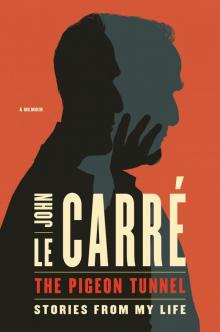 The Pigeon Tunnel: Stories From My Life
The Pigeon Tunnel: Stories From My Life Single & Single
Single & Single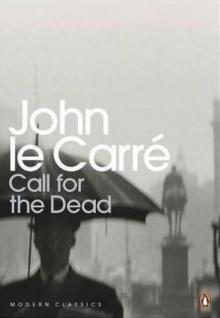 The Spy Who Came in From the Cold
The Spy Who Came in From the Cold The Looking Glass War
The Looking Glass War The Night Manager
The Night Manager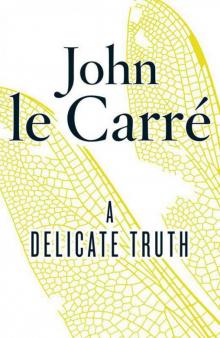 A Delicate Truth
A Delicate Truth A Perfect Spy
A Perfect Spy The Little Drummer Girl
The Little Drummer Girl Absolute Friends
Absolute Friends A Murder of Quality AND Call for the Dead
A Murder of Quality AND Call for the Dead The Russia House
The Russia House The Tailor of Panama
The Tailor of Panama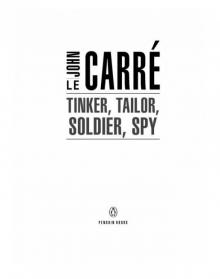 Tinker, Tailor, Soldier, Spy
Tinker, Tailor, Soldier, Spy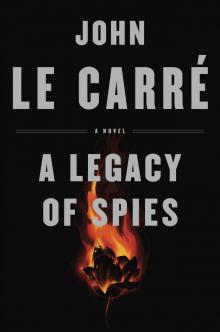 A Legacy of Spies
A Legacy of Spies The Mission Song
The Mission Song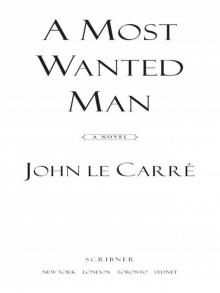 A Most Wanted Man
A Most Wanted Man John Le Carré: Three Complete Novels
John Le Carré: Three Complete Novels The Secret Pilgrim
The Secret Pilgrim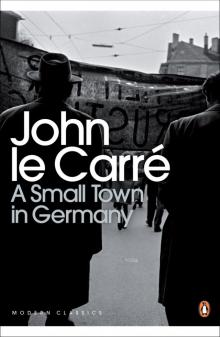 A Small Town in Germany
A Small Town in Germany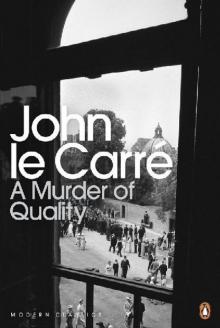 A Murder of Quality
A Murder of Quality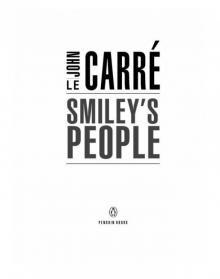 Smiley's People
Smiley's People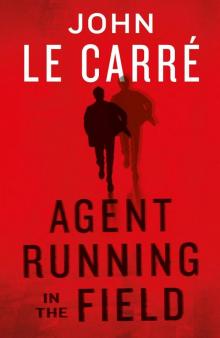 Agent Running in the Field
Agent Running in the Field The Spy Who Came in from the Cold s-3
The Spy Who Came in from the Cold s-3 The Pigeon Tunnel
The Pigeon Tunnel The Russia House - 13
The Russia House - 13 The Honourable Schoolboy
The Honourable Schoolboy Call For The Dead s-1
Call For The Dead s-1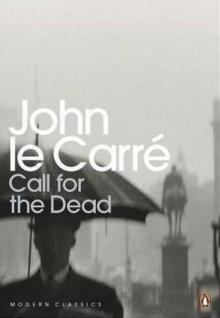 Call for the Dead
Call for the Dead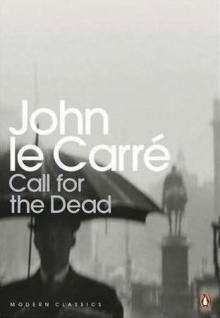 Call for the Dead - 1
Call for the Dead - 1